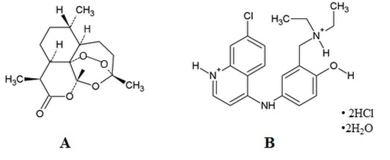
Cocrystallization of Artemisinin and Amodiaquine Hydrochloride
Abstract
Artemisinin (ART) and amodiaquinedihydrochloride dihydrate (AQD) was selected
as model host and guest molecules in the study. Cocrystallization of ART and AQD at mole
ratio of 1:1 by temperature change technique using ethanol, new structure was found, Rec-
ART-AQD (1:1), showed distinctively different XRPD pattern from control. However, major
XRPD pattern remained as amodiaquine nonohydrate (AQM). In addition, FT-IR spectrum of
Rec-ART-AQD (1:1) showed the shift in wavenumber from 3440 cm-1 to lower region. This
shift was due to the H-bonding of –NH functional group on AQM interacting with ART.
Thermal analyses of Rec-ART-AQD (1:1) also show lower average endothermic dehydration
energy starting at slightly lower temperature than AQM which correlates well with TGA
results. Rec-ART-AQ (1:1) was analyzed for each component by HPLC. The result shows
that the recrystallized crystal contains 3.50% w/w of ART signifying ART:AQM mole ratio
of 1:16 in the cocrystal. The solubility of ART in Rec-ART-AQ (1:1) at 30°C is 79.87µg/ml
where it was found to be 33.41% higher than the original ART solubility (59.87µg/ml). Rec-
ART-AQ (1:1) was found to have good stability with no observable water uptake under
various humidities generated by dynamic vapor sorption (DVS) apparatus. Rec-ART-AQ
(1:1) shows slight increase in antimalarial activity against P. falciparum. From the above
supporting results, crystals obtained by recrystallization of ART together with AQD are
cocrystals with uniform distribution of individual ART molecule in the major crystalline
lattice of AQM at a mole ratio of 1:16.
Full Text:
141-148:PDFRefbacks
- There are currently no refbacks.

